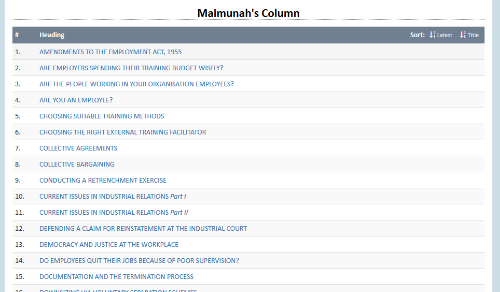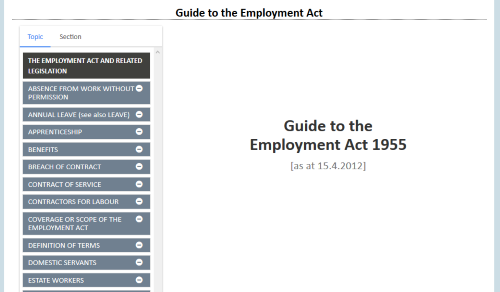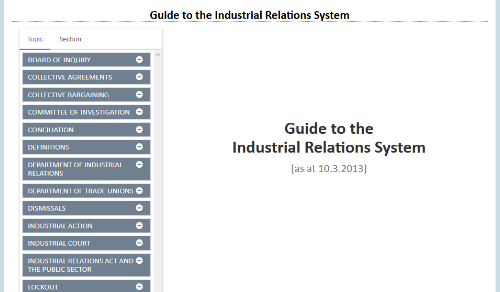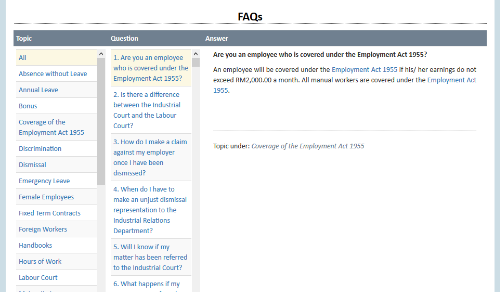 |
Maimunah's ColumnMaimunah Aminuddin is a retired Professor from the Faculty of Business Management, University Teknologi MARA (UiTM) with vast experience in the areas of management and human resources. She is a fellow of the Malaysian Institute of Human Resource Management (MIHRM) with expertise in the areas of employment, labour and industrial relations laws. She has authored numerous publications in the aforesaid areas, such as the Essentials of Employment and Industrial Relations (2009) and Termination of Employment - Understanding the Process, which was revised in 2012 and is in its 2nd Edition. Her latest book, the Employment Law Manual for Practitioners, was published in October 2013.Queries and comments may be sent to the columnist at letters@mylawbox.com with the sender’s full name and e-mail address. |
 |
Guide to the Employment Act 1955All employers who employ people to work in Peninsular Malaysia must comply with the Employment Act 1955. This key piece of labour legislation applies mostly to workers earning not more than RM2,000 per month, but also, since the 2012 amendments, includes sections which apply to all employees. The topics in the Guide are offered in alphabetical order and are written in a manner that they can be understood by readers without legal training. Each topic is divided into sub-headings in the form of questions. All sections of the Act are included but with particular emphasis on Absence from Work, Annual Leave, Coverage of Scope of the Act, Foreign Employees, the Labour Court, Maternity Leave, Sexual Harassment and Wages. The relevant section in the Act is listed and examples of court judgements are provided. The Guide also provides a brief overview of the Labour Ordinances of Sabah and Sarawak and the Employment (Part-time Employees) Regulations 2010. |
 |
Guide to the Industrial Relations SystemThe Industrial Relations Act 1967 and the Trade Unions Act 1959, together create the boundaries for the industrial relations system. Employers, employees and trade unions throughout Malaysia are required to comply with these two Acts. The Guide provides topics in alphabetical order which explain and illustrate by case examples the requirements of the two Acts. All sections of the Acts are included, with emphasis on Collective Bargaining, Collective Agreements, Functions of the Department of Industrial Relations, Functions of the Department of Trade Unions, Penalties, Pickets, Recognition of a Trade Union, Role of the Minister of Human Resources, Strikes, Trade Disputes and Trade Unions. Each topic is divided into sub-topics for easy reading. |
 |
Practical HR ManagementPractical HR Management provides insight into topics such as hiring, firing, privacy, discrimination, sexual harassment and more. It features real scenarios and insightful commentary from leading industry experts and employment law practitioners. Discover techniques you can use to engage your employees in your workforce to drive results for both your organization and your employees. Find answers to your employee problems from practitioners who face the same labour and HR challenges you have every day. |
Cases Highlight
-
USAMA AHMED JUNAID v. CONCENTRIX CVG MALAYSIA SDN BHD
INDUSTRIAL COURT, KUALA LUMPUR
AHMAD RAZIF MOHD SIDEK
AWARD NO. 751 OF 2025 [CASE NO: 3-4-1183-24]
14 MAY 2025An international organisation does not automatically enjoy immunity from legal process in employment disputes, particularly claims of constructive dismissal emanating from breaches of the employment agreement. Such immunity is not absolute and requires the organisation to demonstrate that the legal action impedes its core functions or is necessary for its independence and neutrality. Claims relating to an employee’s personal rights under an employment contract, such as the agreed salary and responsibilities, fall within the jurisdiction of the Industrial Court unless explicitly curtailed by statute.
Article Highlight
-
MINISTRY MUST IMPROVE LIVELIHOOD OF GOVT HEALTHCARE WORKERS OR RISK LOSING THEM
Malaysia's public healthcare sector risks losing even more professionals if the Health Ministry refuses to take immediate measures to improve their livelihoods. Government healthcare workers, upset with the ministry's decision to reject the proposal to increase on-call allowances, told the New Straits Times that they were overworked and severely underpaid. Speaking on the condition of anonymity, one medical officer (MO) said they were bogged down with work, going as far as describing the workload as "crazy". "I've never experienced an increase in allowances ever since I was a houseman in 2016.
SARAWAK TO CREATE 1.5 MLN JOBS BY 2030, UGGAH TELLS STUDENTS TO PREPARE THEMSELVES
Some 1.5 million jobs are expected to be created in Sarawak up to the year 2030, said Deputy Premier Datuk Amar Douglas Uggah Embas.
He said these jobs will be generated by the many programmes and plans of the state’s Post Covid-19 Development Strategy (PCDS) 2030, of which one of its objectives is to increase the people’s income.
“Out of the total (1.5 million jobs), about 200,000 would be in the technical or skill sector. I have been told that Petros, as the third largest oil and gas company in the country, will need 20,000 technicians or skilled workers.
Global Media Reports
MALAYSIA
Industrial court awards RM1.38 million to ex-employee for wrongful dismissal
| Friday, March 14, 2025
...
Court rules ex-husband 'orchestrated' dismissal of divorced director
| Thursday, December 19, 2024
...
ASEAN
Meta staff came to Singapore on employment passes only to be retrenched months later
channelnewsasia | Sunday, December 18, 2022
...
Employment in Singapore expands in Q3 but retrenchments go up, led by tech firm layoffs
channelnewsasia | Thursday, December 15, 2022
...
WORLD
Australian economy adds twice as many jobs as expected as unemployment rate rises to 3.7%
| Wednesday, November 22, 2023
...
National living wage to rise by almost 10% to £11.44 an hour
| Tuesday, November 21, 2023
...

| CLJ eBookstore | |
Events Events Calendar Events Calendar |
|
Our Group Websites www.cljlaw.com www.cljlaw.com www.mylawbox.com www.mylawbox.com www.shariahlaw.com www.shariahlaw.com(Available with separate subscription plan) |
|
Useful Links Industrial Court Industrial Court MOHR MOHR More ... More ... | |
Resources MDEC eXpats Service Centre MDEC eXpats Service Centre
| |
Legislation Legislation: An Overview Legislation: An Overview Latest Malaysian Acts Latest Malaysian Acts Latest Malaysian Bills Latest Malaysian Bills |







